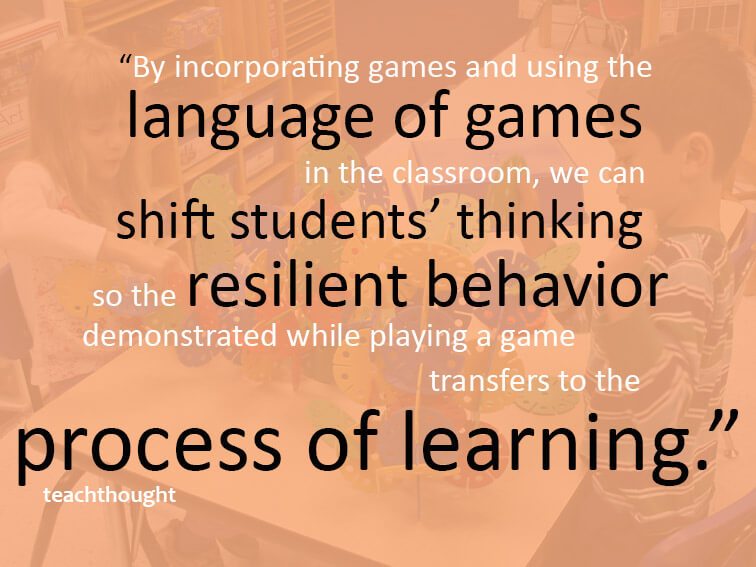
contributed by Mary Wissinger
Let’s face it: our students are playing games. Lots of them.
It’s easy to vilify games and say they are the cause of shorter attention spans and behavior issues, but for better or worse, games are not going anywhere. As educators, we have the chance to tap into a movement that has captivated our students’ attention. By incorporating games and using the language of games in the classroom, we can shift students’ thinking so the resilient behavior demonstrated while playing a game transfers to the process of learning.
In a growth mindset, there are larger factors than the outcome. Progress and growth are acknowledged as valuable in the learning process. This is directly in line with our students’ relationship to games. They generally play games to win, of course, but mostly the point of playing a game is to play. They enjoy the experience of the game, and then there is an outcome. With this in mind, it’s not such a leap from a sandbox game (like Minecraft) to the sandbox that is art class. Yes, the final product is important, but how we get there is also of great importance. In any class, educators hope that students value the content, but also the very process of learning and thinking. We can spark excitement about learning by adopting a game mentality.
See also 50 Of The Best Games For Learning
With a game, kids already expect a learning curve. They know they have to learn the rules in order to play. Whether in kickball on the playground or in a video game, there are rules about what you can and cannot do. This transfers directly to any educational concept where requisite knowledge is required. Once they understand the rules of bonding, they can draw a molecule. Once they understand a pentatonic scale, they can use it to improvise a song.
We can bridge this gap by incorporating games that allow the practice of educational concepts, such as word games or logic puzzles. Students can literally play with the concept, and enjoy themselves. In this low-stakes, supportive environment, students can feel free to take intellectual risks because it’s just a game. This takes the intimidation out of learning and gets them excited about what’s coming next. Another possibility is to acknowledge accomplishments as if students have just won a game or completed a level. Get creative about how to mark when they’ve mastered the songs for the concert, or successfully completed the complex experiment.
The Challenges Of A Fixed Mindset
To a student locked in a fixed mindset, every school task either keeps them on track or derails their dreams. A fixed mindset says, “If I score a ____ on this test, then I am _____.” This is limiting but can be avoided with one word – yet. It’s an important word in the vocabulary of someone with a growth mindset. The word implies that eventually, with effort, the person will complete the task or have the knowledge required by the situation.
See also 25 Ways To Help Students Develop A Growth Mindset
Games give students a chance to practice saying yet. I haven’t found the treasure yet. I haven’t won a round yet. They are playing and learning, and a setback is natural and is not ‘failing.’ Another game could start soon. What’s so wonderful about games is that they teach life lessons. When playing any game, kids learn that they will win some and lose some. Even if they do everything right, it might not work out. They might have to try again. That is merely part of playing the game, and (spoiler alert!) part of living as a human being on the earth.
It’s tough, though, for students to persist when they get a low grade or see themselves repeatedly not meeting the objectives of a unit. This presents a unique opportunity for educators to tap into the mentality of games. A seasoned gamer never quits after losing the first level. They take what they’ve learned, and try that same level again. Once a player plays enough, they become proficient, complete their tasks, and they are ready for the next level. We can use this language of games to talk about meeting benchmarks, or any objective. If a student is not ready to ‘level up’ with a concept, they know they can try again with more information or a different strategy. Whatever language is used, a game mentality can help students move forward in the face of adversity.
See also How Gamification Uncovers The Nuance Of Learning
The true beauty of a game is that, like a growth mindset, the outcome is never fixed. Somebody different could win every time. A strategy might not always work. But, each turn presents an opportunity to move closer to the end goal. In this relaxed environment, students can learn how to laugh off a bad turn and later cheer on their peers. When the time comes, they will know how to shake off a low grade, re-focus on their learning, and help others do the same.
Game on!
Mary Wissinger is a writer, educator and Creativity Coach found at Chin Up Heat Open. She is currently is on the team at Genius Games, a company designing science-themed tabletop games that are kid tested and educator approved; image attribution flickr user woodleywonderworks and sharonmollerus




